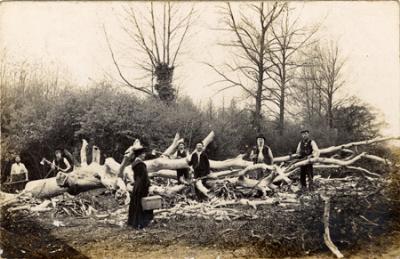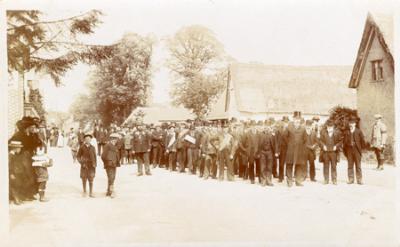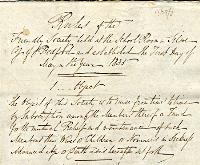Odell Sharnbrook Paths to Crime Walk stop 3 Great Wood
Odell Great Wood

Damage at Odell Great Wood after a storm in 1906 [ref.Z1306/100/35/7]
The Hatchet Man
In January 1844 William Barley, a farm labourer of Odell, left a two-handed long handled axe under an ash stump in Odell Great Wood. The next Tuesday the axe was gone. Joseph Mason of Felmersham had been seen working near the place but denied having seen the axe. About a fortnight later part of the handle was brought to William Barley by William Cooper of Odell. Barley then applied for a search warrant. As a result, PC James Danes brought him a hatchet which had been given to him by Mason's wife. Mason claimed that he had found the axe in the wood and had cut the handle because it was no use to him. Barley had no trouble identifying the axe as his from the shape and from the name on it, and also from it having been broken in the front and at both points and then ground. He valued it at two shillings. Mason claimed he had found the axe while he was working, but was found guilty of stealing it and sentenced to three months imprisonment with hard labour.
Although PC Danes found the axe (or what was left of it) on 8th March he did not arrest Mason until 26th March, saying that the reason for the delay was that Mason was unwell and "in the Medical Club". Friendly societies were common at this time, providing some security for their members in the event of accident, illness, old age or death.

Friendly Society Parade at Riseley c.1905 [ref.1306/100/35/7]

Rules for the Friendly Society at Silsoe in 1835 [ref.P12/28/3]
Unfortunately the funds collected by these clubs and societies could prove a temptation. In 1836 the landlord of the Bull at St Neots called the police, concerned that he had a customer with a large amount of money he suspected had been acquired dishonestly. The man was searched and fourteen and a half sovereigns together with some silver was found on him. He admitted to being Isaac Norman, a carpenter from Willington. Norman was put into the cage (lock-up) at St Neots and after speaking to his father admitted to the police that the money was stolen.
Enquiries were made and the course of events established. A benefit club known as the Amicable Society had been established in Willington for which John Day was clerk. Meetings were held quarterly and the box containing the society's funds was kept under a bed at Day's house. The box had three locks with the keys being kept separately by Day and the two stewards of the society. When money was needed for sick members the three would gather to open the box. Isaac Norman had been a member of the society with his father and brother, and had been one of the stewards until around twelve months previously so was well aware where the box was kept. He had broken into the house by removing a pane of glass from a window, reaching his hand through and opening the casement. Norman had then used his carpentry skills to bore a hole in the corner of the box through which he could put in a small saw. He was then able to saw a section out of the box allowing him to reach his hand inside and pull out a second, small box which contained the gold and silver inside a linen bag. From the bag Norman stole nineteen sovereigns, two half sovereigns, eight half crowns, ten shillings and ten sixpences. For his crime Norman was sentenced to transportation to Australia for life and was sent to New South Wales on the Prince George in December 1836. He died in Sydney in 1848 aged thirty five.
References: QSR1844/2/5/18; QSR1836/4/5/15; QGV10/1; QGV10/2